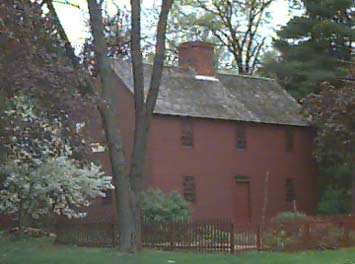Father of the American Dictionary

Father of the American Dictionary

Noah Webster was born on October 16, 1758, in West Hartford, Connecticut. Webster's family was supported by his father, who worked as a farmer and a weaver. His mother worked at home, taking care of Noah and his four siblings. Noah,Charles, and Abraham helped their father with the farm work, while his sisters, Mercy and Jerusha, worked with their mother to keep house and make food and clothing for the family.
In Webster‚s time few people went to college, but Noah loved to learn so his parents let him go to Yale. At the time Yale was Connecticut's only college. He left for New Haven in 1774, when he was 16. Webster's years at Yale coincided with the Revolutionary War. Because New Haven had food shortages during this time, many of Noah's classes were held in Glastonbury. In one of Webster‚s reminiscences, he recalls the shortages through which he suffered while at Yale:
Œ"So impoverished was the country at one time," he writes, "that the steward of the college could not supply the necessary provisions of the table, and the students were compelled to return to spend several months at home. At one time goods were so scarce that the farmers cut corn-stalks and crushed them in cider-mills, and then boiled the juice down to a syrup as a substitute for sugar."‚ (Scudder 8) *
Webster endured these hardships however and graduated in 1778. Originally intending to study law after his days at Yale, Webster found instead that he would need to earn some money before he could pay for more schooling. He began teaching in Hartford after his graduation.
At the time, American schools were ill-equipped to handle the numbers of children who were trying to get an education. Untrained teachers were often forced to teach in crowded classrooms with no desks, poor supplies, and unsatisfactory texts. The texts that students did have available to them all came from England. These conditions, and a desire to have American children learn from American books, led Webster to write his own textbook in 1783. He called his text A Grammatical Institute of the English Language, but it soon became known simply as the "Blue-backed Speller." In the next two years he expanded his work with a grammar book and reader that appeared in the same distinctive blue cover. This series of texts was edited and revised several times over the next sixty years. After over 250 printings Webster‚s work became undoubtedly the most popular schoolbook ever published in the United States.
Webster
continued to work as a teacher while also spending a great deal of
time studying law, traveling, and getting into local politics.
In 1800, Webster began work on his most noteworthy accomplishment,
the first American dictionary. For over 25 years Webster worked
on the American Dictionary. By the time that it was first
published, in 1828, his dictionary was far superior to any other work
of its kind. It appeared in two volumes and contained
definitions and complete etymologies of over 70,000 words. The
American Dictionary covered scientific and technical terms, terms
that were specifically from American culture and institutions, and a
large amount of encyclopedic information. Although
Webster‚s spelling in the dictionary is more conservative than
his spelling in the later editions of the "Blue-backed Speller," his
ideas about English as an American language are very
evident.
Webster had specific ideas
about how American English should differed from British English and
he did a lot to bring about these changes by publishing them in his
speller and dictionary. Webster proposed dropping the -u
from words ending in -our, making words like flavour
into flavor. He changed words that ended in -ick
to a simpler -ic ending, like musick to
music. Webster changed other spelling patterns including
-re to -er (centre to center), -ce
to -se (offence to offense), and -que to
-k (cheque to check). He also popularized
rules for spelling certain words differently depending on the
stress. Some changes that he proposed, unlike the
aforementioned that we all now recognize and use, never became
popular. He tried unsuccessfully to drop the final -e
from words like definite and examine and eliminate
silent letters in many words.
Noah Webster is
responsible for many changes in the history of American
English. His textbooks taught children for nearly 100 years and
his dictionary is still alive today, taking on revisions and
additions since its first publishing 172 years ago. He
dedicated his life to pushing forward our language and our culture,
missions in which he met with the utmost success. As our
language continues to grow and change, the Webster name will ring
with familiarity in every home across the United States.
*
 Visit
Merriam-Webster online to see what Noah Webster
started!
Visit
Merriam-Webster online to see what Noah Webster
started!
 Visit
the Noah Webster House Museum of West Hartford History
online!
Visit
the Noah Webster House Museum of West Hartford History
online!
* Information
for this page from the above websites and:
Crystal, David. The
Cambridge Encyclopedia of the English Language. Cambridge
University Press. New York, NY. 1995.
Scudder, Horace.
Noah Webster. Houghton, Mifflin, and Company.
Boston, MA. 1886.
page by Gavin Fitts